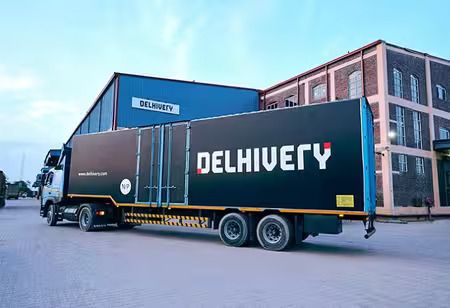
Delhivery Bets on Rapid Commerce for Growth, Logs Rs.91 Crore Net Profit in Q1

 Delhivery, a large logistics company, is increasing its partial truckload (PTL) capabilities and using the growth of rapid commerce to push into new delivery patterns.
Delhivery, a large logistics company, is increasing its partial truckload (PTL) capabilities and using the growth of rapid commerce to push into new delivery patterns.
The firm strategically invested ₹14 crore in two new services during the first quarter (April–June) of FY26: Delhivery Direct, an on-demand intracity shipment service, and Rapid Commerce, a 2-hour delivery service. In April-June, Delhivery's net profit increased by 68.5% to 91 crore. At Rs.2,294 crore, the company's operating revenue grew six percent annually. Delhivery's stock ended Friday's trading session on the BSE one percent lower at Rs.429.85 per share.
“The real opportunity lies in servicing large brands working with quick commerce platforms—whether FMCG, grocery, or packaged food by offering high-precision, appointment-based deliveries to—and returns from—dark stores and mother warehouses. Quick commerce has created a new channel and incremental demand. Though our entry is just 100 days old, it’s already become an exciting growth driver within our PTL business,” says Sahil Barua, chief executive of Delhivery.
A logistics service model that falls between LTL (less-than-truckload) and FTL (full truckload) is known as a partial truckload firm. It handles medium-sized packages that are too big or heavy for regular parcel delivery but don't need a full vehicle. However, he continued, rapid commerce is still mostly focused on the supermarket, packaged food, and BPC (beauty and personal care) sectors, and it operates mostly in large cities. Large marketplaces' order volumes and grocery GMV (gross merchandise value) have probably been significantly impacted, but their impact on e-commerce as a whole is probably going to be minimal.
Also Read: Steps to Enhance Your Organization's Cyber Resilience
This is because it is inherently difficult to strike a balance between large product selections and quick delivery times, particularly in increasingly scattered urban areas. More importantly, low-velocity, long-tail categories like clothing, accessories, and home and leisure goods account for the majority of e-commerce volumes, which originate from small cities (tiers 2-4). These categories are difficult or expensive to carry in tiny quantities among dark stores since of their erratic demand patterns.
Therefore, the business anticipates that rapid commerce will have little effect on their future overall volume trajectory. Slower-selling, specialty goods like clothing that have erratic demand yet together account for a significant portion of e-commerce volumes, particularly in small cities, are referred to as low-velocity, long-tail.
Currently, Delhivery's Rapid network has 20 dark stores in three locations, providing direct-to-consumer companies with 1- to 3-hour fulfillment and common inventory infrastructure. By Q4 of FY26, there are plans to expand this to 35–40 dark establishments spread across six cities.
Also Read:Varun Mohan - The Man Chosen by Google to Boost its AI Coding Projects
Rapid may eventually bring in between ₹80 and ₹100 crore, but it is anticipated to remain a niche product within Delhivery's larger Express portfolio, the business stated. The company's customer-facing app, Delhivery Direct, which allows on-demand inter-city shipment, has now been extended to offer intra-city delivery as well. According to Barua, more investment is anticipated until FY26 because these offers are still in their infancy, especially in fleet capacity and demand generation for Delhivery Direct.